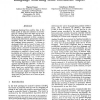Free Online Productivity Tools
i2Speak
i2Symbol
i2OCR
iTex2Img
iWeb2Print
iWeb2Shot
i2Type
iPdf2Split
iPdf2Merge
i2Bopomofo
i2Arabic
i2Style
i2Image
i2PDF
iLatex2Rtf
Sci2ools
130
click to vote
COLT
1992
Springer
1992
Springer
Language Learning from Stochastic Input
Language learning from positive data in the Gold model of inductive inference is investigated in a setting where the data can be modeled as a stochastic process. Specifically, the input strings are assumed to form a sequence of identically distributed, independent random variables, where the distribution depends on the language being presented. A scheme is developed which can be tuned to learn, with probability one, any family of recursive languages, given a recursive enumeration of total indices for the languages in the family and a procedure to compute a lower bound to the probability of occurrence of a given string in a given language. Variations of the scheme work under other assumptions, e.g., if the probabilities of the strings form a monotone sequence with respect to a given enumeration. The learning algorithm is rather simple and appears psychologically plausible. A more sophisticated version of the learner is also developed, based on a probabilistic version of the notion of t...
COLT 1992 | Independent Random Variables | Inductive Inference | Machine Learning | Recursive Enumeration |
Related Content
| Added | 09 Aug 2010 |
| Updated | 09 Aug 2010 |
| Type | Conference |
| Year | 1992 |
| Where | COLT |
| Authors | Shyam Kapur, Gianfranco Bilardi |
Comments (0)

